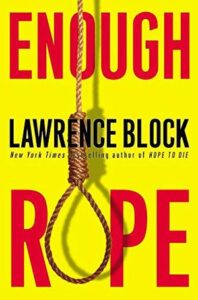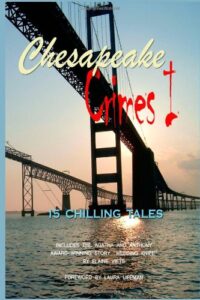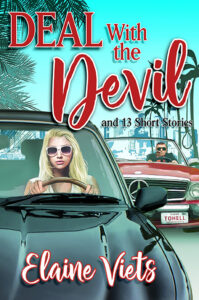By Elaine Viets
 Did you ever say this? “I’m trying to write a short story, but I’m blocked. I’m getting nowhere.”
Did you ever say this? “I’m trying to write a short story, but I’m blocked. I’m getting nowhere.”
That happens to every writer. It certainly happens to me. Short stories are hard to write. In some ways, they may be harder to writer than novels. Here are a few tips for when you feel blocked working on your short story:
Think small – and think twisted.
There are good reasons why you can’t continue your short story. You could be blocked because you have too much going to on. In short, you may be writing a 5,000-word novel instead of a short story.
In a short story, you don’t need long, dreamy descriptions of the scenery.
You don’t need six subplots.
You don’t need to tell us your character’s awful childhood – unless it’s vital to the plot.
It’s a short story.
Think small.
Here’s another reason why your short story may be blocked: How many characters does it have?
If your short story has more than four major characters – you may — accent on may –have too many. It’s like being in a small room with too many people. You can’t move.
The short story is a small world.
Don’t make work for yourself. Giving all those people something to do is hard labor. Think small. Cut back on your characters.
If your story is going nowhere, consider some pruning. Clear out all the extraneous details, the unnecessary characters, the descriptions of the weather.
If you’re still not sure, read the story out loud. Read it to your spouse, or your dog, or your wall. But tell the story instead of looking at it on the page.
That’s a good way to find out what works – and what doesn’t.
Lawrence Block is a master of the traditional short story.
Let me show you what he does in one paragraph – one – in a short story called “This Crazy Business of Ours.” It’s in Block’s anthology called Enough Rope. If you’re interested in traditional short stories, I recommend this anthology.
 “This Crazy Business of Ours”
“This Crazy Business of Ours”
The elevator, swift and silent as a garrote, whisked the young man eighteen stories skyward to Wilson Colliard’s penthouse. The doors opened to reveal Colliard himself. He wore a cashmere smoking jacket the color of vintage port. His flannel slacks and broadcloth shirt were a matching oyster white. They could have been chosen to match his hair, which had been expensively barbered in a leonine mane. His eyes, beneath sharply defined white brows, were as blue and as bottomless as the Caribbean, upon the shores of which he had acquired this radiant tan. He wore doeskin slippers upon his small feet and a smile upon his thinnish lips, and in his right hands he held an automatic pistol of German origin, the precise manufacturer and caliber of which need not concern us.
See how Block establishes a character in one paragraph? That is true economy of writing.
Make sure your story is about what it’s about. In a novel, you don’t have to get to the story right away. You have time to develop it. Time to build. Slowly.
In a short story, you have to hit them and run.
This is one of my favorite short story leads. It’s by Maria Lima in the Chesapeake Chapter Sisters in Crime anthology called Chesapeake Crimes I. Here it is:
“The telegram said it all: AUNT DEAD. STOP. BUTLER DID IT. STOP. FLY SOONEST. STOP. GERALD.”
That’s short and to the point. The writer has hooked you and she’s ready to move on to the story.

That takes me to the second requirement of a good short story. It needs a twist. It needs a surprise – either in the beginning or the end. But get that surprise in there.
Here’s the lead to my short story, “Red Meat,” which was nominated for an Agatha and a Macavity. It was in Blood on their Hands edited by Lawrence Block, and now in my own anthology, Deal with the Devil and 13 Short Stories.
“Ashley has a body to die for, and I should know. I’m on death row because of her.
“You want to know the funny thing?
“My wife bought me Ashley. For a present.”
There’s your twist – in three sentences.
Maybe your short story has all those things, but so what? It still feels lifeless.
You can’t make it get up and walk. You need something to liven it up. Ask yourself what specialized knowledge you have that could make your short story unique, and then build the story around it.
I was asked to write a short story for a gambling anthology. I panicked. I was going to tell my editors no. I don’t know how to gamble. I don’t play poker or blackjack. What am I doing in a gambling anthology?
Then I realized I did know gambling. My aunts used to take me to bingo. I was brought up Catholic – and I learned how people can cheat at bingo, and especially, how they can cheat at cruise ship bingo. Do you know what the prize is for cruise ship bingo?
Twenty thousand dollars on some cruises. That’s major money. That’s big-time gambling. Bingo! I had a short story.

The result was “Sex and Bingo,” which was nominated for an Agatha Award.
At a short story seminar in New York, I heard top editors talk about what made a good short story, what they buy, and what they won’t buy.
Here are some things editors DO NOT want:
 – No more stories about husbands who kill wives, or vice versa.
– No more stories about husbands who kill wives, or vice versa.
– No more stories ending, “And then I woke up.”
What do they want?
A fresh voice.
An unusual location.
An offbeat character.
An opening that grabs them.
That was the most important part. You have one sentence – maybe two – to catch an editor’s eye with a short story.
Make every word count.
***
Elaine Viets was nominated for a 2021 International Thriller Award for her short story: “Dog Eat Dog” in The Beat of Black Wings, edited by Josh Pacher. Crippen & Landru has published Elaine’s own collection, Deal with the Devil and 13 Short Stories Stories. Buy it here: https://www.amazon.com/Deal-Devil-Elaine-Viets/dp/1936363275

Thank you, Elaine, for another terrific post. I enjoyed the mention of “This Crazy Business of Ours” by Larry Block. It’s one of my favorite stories by one of my favorite authors. I also appreciate the list of short story wants and not-wants from editors. May I add one more not-want that I heard from an editor? “Don’t kill the cat.” Makes sense.
Have a great day and holiday, Elaine!
Thank you, Joe. One of the mysteries of mystery writing is you can slaughter humans by the score, but heaven help you if you kill a cat or a dog.
Thanks for this post, Elaine. I struggle with short stories. I’m keeping this for the next time I’m brave enough to try one. Have to remember the ‘twist.’
You’re welcome, Terry. And you’re way too good to worry about not mastering short stories.
Thank you for writing these excellent tips! I’m primarily a short story writer and, lately, primarily a short story reader. There are so few craft articles and books on the form. It’s great to hear from a pro on the topic. I suffered early on in my short story writing from exactly what you opened with: trying to cram a novel into 10 pages. Now I focus on one character and a couple scenes. The twist, alas, is the hardest part but oh so necessary.
Glad this blog could help you, Philip.
Great post, Elaine. Thanks for the tips and lists. Those anthologies you mentioned sound interesting. The short story that intrigues me the most is “Sex and Bingo.” What anthology is it in?
And sometime I’d love to see a TKZ post on “How to Cheat at Bingo, and other life lessons.”
Have a great day!
“Sex and Bingo” was in an anthology called “High Stakes,” edited by Robert Randisi.
Hi, Steve. “Sex and Bingo” was in an anthology called “High Stakes” edited by Robert Randisi.
Nice recap on short stories, Elaine. It’s an area I haven’t touched unless you consider some of my long blog posts as short stories. Limited characters and sticking to one plot line were the two big take-aways for me this morning. Thanks!
Glad a pro like you found this helpful, Garry.
Spot-on advice, Elaine. Over the years, I’ve learned that whenever I’m stuck, it’s because I’ve created too much clutter. As the man said, “Simplify, simplify!”
True for any kind of writing, Mike.
Terrific post, Elaine. Short stories are a challenge, certainly for me, and I spent many years writing ones that didn’t work until I doubled down on studying writing craft. Your advice to “keep it small” is spot-on. Failing to do so was part of my problem.
Your advice on having a twist is also so true, as well. Creating that surprise that gives the reader a different perspective, especially when combined with an emotional moment, can be so powerful.
Thanks, Dale. Keep writing!
Great tips, Elaine. I like the short story format although I only have one published. You’ve inspired me to read more of them in 2022 and publish another one. Thanks!
Go, Kay!
Great advice, Elaine. I think I’m going to write “Think small — and think twisted” on a post-it note and slap it on the wall above my desk!
Glad you stopped by, Alan, but an award-winner like you doesn’t need my advice.
Glad you stopped by Alan. And congratulations on all your short story awards.
Excellent guidelines, Elaine! You can cheat at bingo??? Gotta read your short story and learn how!
O. Henry and Alfred Hitchcock Mystery Magazine specialized in twists that made the reader gasp.
I started off writing short stories (didn’t have the attention span for a novel) and appreciate their economy–no time to waste, no room for clutter.
The SS skills you mention also work for novels–I try to think of each scene as a self-contained mini-story that ends with a twist or reversal to propel the reader into the next scene.
Merry Christmas and Happy New Year to you and your family!
You can cheat at bingo, Debbie, but you’ll have to read my story to find out how.
Happy holidays to you and yours.
Brava! Those clever twists make all the difference. In my teaching years, I read mostly short works, and still find short stories good “palate cleansers” between long works, and a great intro to new authors. <3
Thanks, Mary. You should know. You’re a storyteller yourself.
Thanks for a fantastic post, Elaine. Gonna keep it in my file.
I’ve been trying my hand at short stories in 2021, and have a few waiting in the wings for . . . well, whatever comes down the pike at me.
But the cool thing is, I submitted a short story to Chicken Soup for the Soul, an edition due out 2/22/22-tagline, Grieving, Loss, and Healing-and it’s been accepted for publication! (I even get a *real* paycheck…)
Call me tickled pink… 🙂
As you should be. Congratulations, Deb. What a terrific showcase for you.
Excellent advice. Sort of the Strunk and White of short fiction. 🙂 My father introduced me to short stories. I have collections of them all over the house.
Now the problem. I read DEAL WITH THE DEVIL. I remember it. I probably posted a review of it. Now I can’t remember RED MEAT.
PS. Really enjoyed Life Without Parole.
“Red Meat” is on page 203, Alan.
“Red Meat” is on p. 203, Alan.
This is very helpful. I have wanted to write short stories and have made a few lame attempts. But I see from your post some of the things that have hindered me because I have pretty much tried the novel in short story format. The necessities of short story format almost make it feel like an alien beast.
Next time I try one, I will keep the points of this post in mind. I look forward to seeing what happens with it! 😎
Keep writing, BK. those weren’t “lame attempts.” They were practice sessions.
Lovely post, Elaine. I find short stories easier to write than novels. I think of them as little novels, maybe to remind myself that character development and relationships as well as plot still matter. The only things I “leave out” are much description and the second and subsequent murders, and that usually limits the story nicely. Btw, I just sat up late re-reading Shop Till You Drop. What a delight!
Thanks, Liz. Some critics think that short stories are the purest form of the mystery genre. Really glad you liked, “Shop Till You Drop,” my first Dead-End Job mystery.
Lots of good stuff here, Elaine. Thanks. I love using short stories to explore ideas that won’t support a full novel, or that I don’t want to live with for six months! Also great for continuing characters.
Both good points, Leslie.
Great advice, Elaine! I started out writing short stories, and that’s where I learned to make every word count.